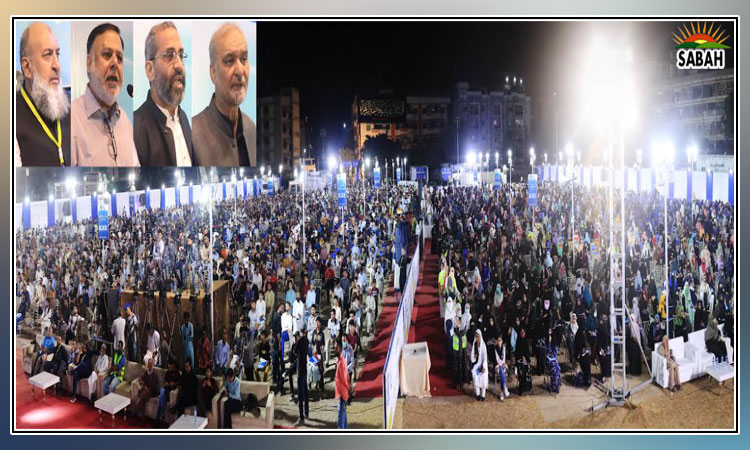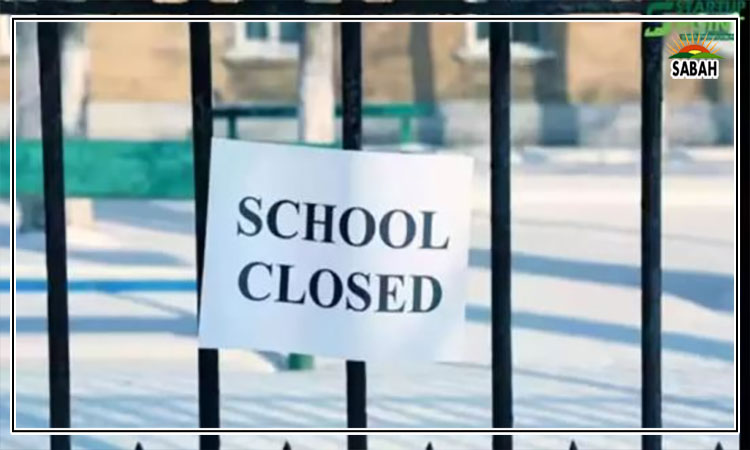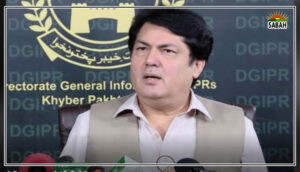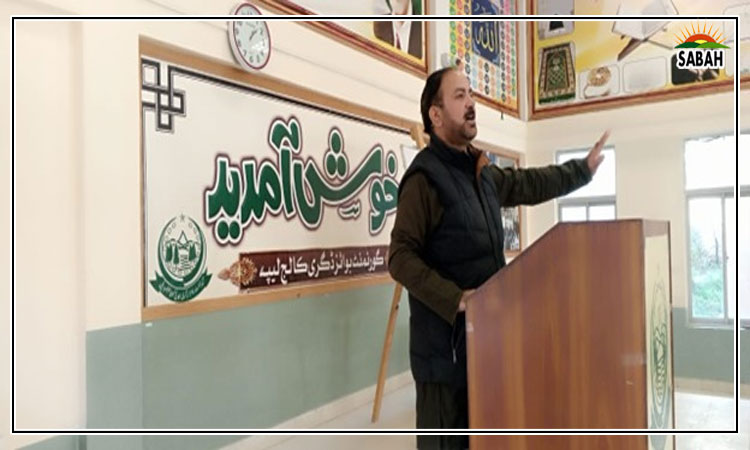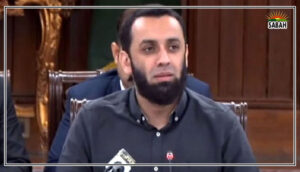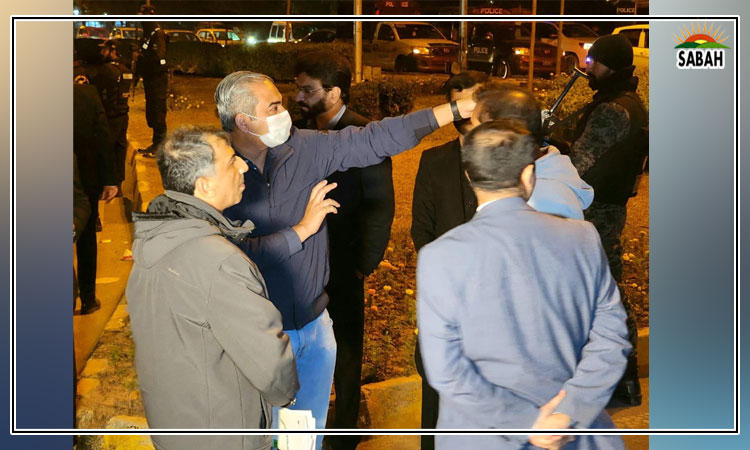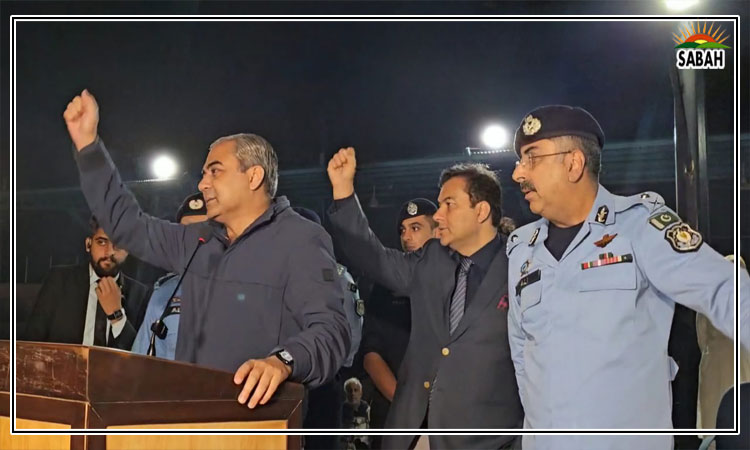CJP Umar Ata Bandial urges federal govt & PTI to resume dialogue for restoring peace in the country
ISLAMABAD, May 15 (SABAH): Chief Justice of Pakistan (CJP) Justice Umar Ata Bandial on Monday urged the federal government and Pakistan Tehreek-e-Insaf (PTI) to resume dialogue for restoring peace in the country as the apex court adjourned for one week the hearing on the Election Commission of Pakistan (ECP) plea regarding the Punjab polls case.
A three-judge bench, led by CJP Umar Ata Bandial and comprising Justice Ijazul Ahsan and Justice Munib Akhtar, heard the matter as the May 14 deadline set by the apex court for holding the polls expired.
At the outset of the hearing, Secretary Supreme Court Bar Association appeared before the court and stated that the SCBA, and advocates were in support of “and express full solidarity with the judiciary”.
Chief Justice Bandial maintained that the Election Commission of Pakistan (ECP) had not adopted its current position earlier, and questioned if points not raised earlier could be presented during the ongoing hearing.
He remarked that it would “be appropriate” for someone else to raise those points as the electoral watchdog did not bring forth the issue of judicial jurisdiction. He continued that the federal government could have raised the matter but did not file a revision. The court issued notices at the request of the ECP.
The Pakistan Tehreek-e-Insaf’s (PTI) lawyer Barrister Senator Syed Ali Zafar said that the scope of the review was “limited”. Syed Ali Zafar contended that new points could not be raised in the revision petition. However, CJP Bandial stated that if the petition was “admissible” then the court wanted to hear the stance of the ECP.
Justice Bandial continued that provincial governments and other political parties will be issued notices and be heard in the matter. He added that some points were for consideration and would be decided on later.
The ECP’s counsel Advocate Sharjeel Sheryar Swati countered that the scope of revision was not limited and jurisdiction could not be limited in constitutional cases.
The CJP reminded him that new points could not be raised in the review.
Syed Ali Zafar stated that May 14 – the date for Punjab polls – had passed and the Constitution had “died”. He said that the caretaker governments were not “unconstitutional” and the court should follow its decision.
The chief justice said the decision would be implemented after it was finalised.
The chief justice stated that the election commission’s stance was that it would conduct elections if given the resources. He continued that the ECP had now opened the “Pandora’s Box”.
“The implementation of the Constitution is my duty. Who will implement the Constitution in the current environment?” he asked.
Justice Bandial maintained that he had asked the government and the opposition to find high moral standards. He added that a party was “violating” the Constitution in February.
PTI lawyer Ali Zafar argued that one week was “too much”, however, the CJP stated that the court had another “important matter” tomorrow”.
According to Justice Bandial, the court would have hurried if it knew that election time had come. He added that the manner in which political forces were working was “not right”.
“People are losing their lives. Institutions are under threats. People’s private and public property is being damaged,” he stated.
He then questioned why the Attorney General for Pakistan (AGP) Mansoor Usman Awan did not restore the negotiations, to which Ali Zafar said that two members of the negotiation team had been arrested.
The PTI lawyer continued that all PTI leaders were under arrest and questioned what negotiations could be taken under such an environment.
“Now there is no negotiation, only the implementation of the Constitution,” he said.
The AGP said that both parties were brought to the table after a lot of effort and that there was a consensus among the parties. He maintained that the problem could have been solved if it was given some time.
AGP Awan said that he was consistently advocating for holding a dialogue. The CJP once again wondered why the government did not file a review petition against the April 4 order.
The chief justice also asked PTI to take high moral ground in the present situation. He further asked the PTI counsel who would accept the result if elections are held in such polarised conditions.
He said that the Constitution protects people’s rights, which could come through peace. The CJP said that the matter would be taken up next week
During the hearing, the CJP observed that the electoral watchdog had raised the issue of funds and security previously. “Today, the ECP has raised a question [mark] regarding the court’s jurisdiction,” he said.
“We will hear all the parties in the case,” the CJP said.
PTI lawyer Ali Zafar contended before the court that the scope of a review petition was limited. “New points can’t be raised in a review petition,” he said, calling on the government to issue directives for the implementation of the court order.
The CJP then said that the court wanted to hear the ECP’s arguments on the maintainability of the petition. He said that notices would also be issued to the provincial governments to hear their respective positions and other political parties.
“The order issued by the government is final,” he said. He further said that the top court did not know nor did it want to know about politics, adding that the court understood how fundamental rights were to be implemented.
“We are sitting here to protect the people’s rights. If their rights are protected, the people will be happy,” he observed. He said that he had seen that the country’s motorways were deserted and the economy had come to a grinding halt.
He also told the PTI lawyer to inform the party’s leadership of how elections could be held in a polarised manner. “You will have to create a high moral ground,” he said, adding that holding elections in 90 days was the main matter.
Justice Bandial further said that an “important matter” would be heard tomorrow. He further said that the manner in which political powers were operating “is not correct”.
“People are losing their lives. Institutions are facing risks and threats,” he said. Justice Bandial also stated that he was the first person to suggest talks between the two opposing sides regarding holding elections in the country. “Negotiations must absolutely happen,” the AGP said.
“Attorney general sahib, why can’t you restart negotiations [with the PTI]?” the CJP asked. However, the PTI’s lawyer interjected here and said that two members of the party’s negotiating team had been arrested.
The AGP contended that the government had taken the matter of holding negotiations “seriously”. He alleged that the PTI had ended the talks between the two sides.
Justice Bandial said that the Constitution guaranteed political rights. “We don’t want to get into political matters and we don’t want to hear anything. We hope that negotiations will start anew and a solution will be reached.”
He called on the AGP to “come forward” and inform his “clients” in this regard. “We expect from both the parties that the [political] environment will improve,” he said.
Meanwhile, the PTI’s lawyer contended that a “so-called” democratic movement had issued directives to arrest the PTI chief. However, the AGP pointed out the violent protests that followed Imran’s arrest.
“The court has declared Imran’s arrest to be lawful,” the AGP pointed out.
However, the CJP insisted that the process for dialogue be initiated once again. He called for addressing the narratives being put forward by both the sides.
“Ali Zafar is correct in saying that the ball is in the government’s court,” the CJP remarked. The PTI lawyer can talk to his leadership if the government invites the opposition for talks, he added.
At the outset of the hearing, the court issued notices to the respondents in the case, including the attorney general for Pakistan and advocate generals of Punjab and Khyber Pakhtunkhwa.
The CJP then asked the parties to give arguments on the admissibility of the plea, inquiring how long would it take the ECP to complete its contentions.
Responding to the inquiry, electoral body’s lawyer said that he will take two to three days.
After this, PTI’s lawyer Barrister Ali Zafar walked to the rostrum and said, “the Constitution has been murdered”. He said that a faction of the country’s population comprising 100 million has been deprived of representation.
The CJP censured the authorities for not complying with the judicial orders to hold the polls on the deadline.
“There is a 90 day period [for conducting elections] according to the Constitution. If there was the order for holding polls on May 14 then it should have been implemented,” CJP Bandial remarked while ordering the authorities to satisfy the court about their conduct.
There are “mature political parties” on both sides, the top judge observed while adjourning the hearing till Tuesday (May 23).
In the 14-page petition, the ECP had asked the apex court to review its decision as the judiciary “doesn’t have the authority to give the date of elections”.
“Such powers exist elsewhere under the Constitution but certainly not lie in a Court of law,” the ECP had said, citing various legalities and reasons behind its statement.
The electoral body accused the apex court of disregarding its constitutional jurisdiction, emphasising that it assumed upon itself the role of a public body in giving a date; “thus intervention by the court is necessitated to correct an error which has effectively changed the settled constitutional jurisprudence of the country”.
Moved through Advocate Sajeel Sheryar Swati, the ECP in its review petition requested the court to recall its April 4 judgment in the interest of justice, arguing that it was per incuriam (lack of jurisdiction) to the constitution. Of the 326 National Assembly seats, 173 and 55 seats are from Punjab and KP, respectively, indicating 72 per cent of the total strength, according to the ECP review petition.
The review petition states that the change of election programme is the solitary domain of the ECP under Section 58 of the Elections Act, 2017.
Since general elections to the National Assembly are due in near future, with its term completing in August 2023, the ground realities need to be considered in true perspective, according to the petition.
The ECP says it requires the government machinery that is non-partisan and has no inclination towards any political party to perform its constitutional duties to conduct the general elections honestly, justly, fairly and in accordance with law. If elections to the NA are held while permanent governments already in place in Punjab and KP, the sanctity, objectivity and fairness of elections to 72pc seats of the national assembly would inevitably be compromised, the petition contends.
The review petition says the question of harmonising Articles 218(3) and 224 as well as the provisions of the Elections Act, 1997 is of the first impression and has not been dealt with by superior courts. It emphasises that the ECP has even been guarded under Article 222 from any intervention in clear words that its power cannot be diluted, whittled away or abridged through parliamentary intervention.
Instead of Section 58 of the Elections Act, the Supreme Court in its order relied upon Section 57 in order to designate President Dr. Arif Alvi as authority for fixing the date where the assemblies stood dissolved by efflux of time, the ECP recalls.
The petition reminds the court that legislature while enacting Sections 57 and 58 of the Elections Act was cognisant of the fact that situations may arise due to which elections dates are required to be changed.
Citing the 2008 general elections, the petition argues that the ECP keeping in view the exigency and requirement of that time had delayed polls for 40 days. That is why the legislature while enacting Section 58 put overriding phrase “Notwithstanding anything contained in section 57”, at the very start of Section 58(1), knowing it fully well that Section 57 enumerates something that is contrary to what Section 58 would consider as permissible.
The petition emphasises that the courts interpret the law, but they do not rewrite it. As per literal interpretation of the provision of Section 58, change of the election programme or giving a fresh programme — of which poll date is an essential component or stage — is ECP’s domain. Thus, Section 58 overrides anything contained in Section 57 of the Elections Act and is divorced, in its essence, from Section 57. That is a simple, plain and clear effect of the overriding clause and as per the established jurisprudence of the country, the overriding clause takes precedence over the provision containing a contrary view, the review petition maintains.
It argues that the SC under no provision of the constitution or the law could have taken the exercise upon itself to appoint the poll date through April 4 order. The appointing of date or changing it is an executive exercise, and certainly not a judicial exercise, it adds.
On the other hand the 14th May (Sunday), a day on which the elections in Punjab were to be held as ordered by the Supreme Court. However, the ruling of the apex court regarding Punjab elections could not be implemented.
The elections did not take place nor could the orders of the Supreme Court be implemented. The Election Commission claimed that it had completed the preparations but owing to unavailability of funds, it was unable to move forward. The political parties also did not agree on the elections only in Punjab.
Given the uncertainty, the election campaign ended before it started, and the PML-N did not issue tickets to the candidates. The ruling parties say that the survival of the country lies in dealing with the crisis through joint efforts and resolving the issues through negotiations.
The SC had ruled the order of the ECP regarding delay in elections in Punjab as null and void, ordering polls on May 14. The apex court had also asked the government to release Rs21 billion in supplementary grant to hold polls, until April 10.
The court also ordered the electoral watchdog to present a report on the provision of funds on April 11. It came as Imran Khan-led party had filed the petition regarding delay in elections after the ECP on March 22 put off the polls till Oct 8, citing financial and security constraints.
Later, the federal government, in response, took the matter to the parliament to get the funding approved. Finance Minister Ishaq Dar presented the election expenses bill in the National Assembly.
The ECP, on April 11, apprised the SC in a report that the government had not provided funds to the commission for holding elections in Punjab.
According to the Election Commission, the government had not yet provided Rs21 billion despite SC’s order and the Punjab caretaker government had agreed to provide only 75,000 personnel for security. “There is a shortage of three lakh security personnel for the elections in Punjab,” the ECP noted.
Upon this, the court issued notices to top officials including Attorney General Mansoor Awan, State Bank of Pakistan (SBP) Governor Jameel Ahmad, Secretary of the Finance Department, and Secretary of the Election Commission of Pakistan (ECP) over failing to provide funds for upcoming Punjab elections.
Later, the PTI and the PDM-led government sat on the negotiating table, starting on April 27, to talk through elections but it culminated in consensus on holding elections simultaneously across the country with an impasse on the date during its third and last round on May 2.
On May 3, the ECP approached the court seeking review of its order to hold polls on May 14. Three days later, CJP Bandial said the apex court would proceed in line with the constitution and would not sit idle on the May 14 election issue if the dialogue between the government and the PTI failed.


